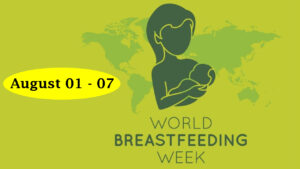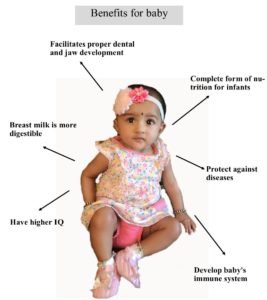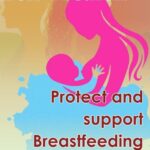Breast feed gives health to baby and keeps mother healthy. Breast milk is a best and precious to an infant as it contains all essential nutrition’s which makes an infant to be healthy, fit and strong. No other substitute can add to this. Breast feeding At least for 6 months is very much essential to an infant.
There is a dramatic decrease in women who are breast feeding in the developed countries. About 80% of women are not breast feeding their children. Many of them are not breast feeding their children for required length of time. In our country breast feeding rate has reduced to 30%. It is serious threat to the development of a nation. To over come this problem Indian Government took an action and adopted IMS act in 1992.
Importance of breast milk
Breast milk usually refers to the milk produced by a female which is usually fed to infants by breast feeding. It provides the primary source of nutrition for newborns, before they are able to digest more diverse foods.
There are two types of milk
1. Colostrum: It (also known as beestings or first milk) is a form of milk produced by the mammary glands in late pregnancy and the few days after giving birth. Colostrum is the thick yellowish fluid that is secreted by the breast in the first few days after delivery, before mature milk is produced. Although only a small amount of colostrum is released from the breast, this liquid is loaded with calories and infection-fighting proteins. Colostrum contains helpful antibodies for the baby’s immune system and helps in early digestion. The baby should be allowed to nurse the colostrum to obtain these benefits.
2. Mature milk: Regular milk or mature milk which is secreted after colostrums. It contains essential carbohydrates, proteins, and antibodies and low in fats. It is easily digestible. It should be given to an infant at least for an age of 6 months.
Fat contents of breast milk:


• Vitamins (fat and water soluble)
• Minerals (especially Calcium, Phosphorus, and Zinc)
• Lactose (aids in Calcium absorption)
• Bile Salt Stimulated Lipase (aids in digestion of fats)
• Cystine ,Taurine
• Secretory Immunoglobulin
• Lactoferrin (binds Iron and makes it unavailable to bacteria in the intestines)
• Lysozyme (breaks cell walls of bacteria in the GI tract)
• Bifidus Factor (creates more acidic stool, inhibits growth of harmful bacteria)
• Polyunsaturated Fatty Acids and essential Fatty Acids (Linoleic, Linolenic, Arachadonic)
• Whey protein
Comparison to other milks:
All mammal species produce milk, but the composition of milk for each species varies widely and other kinds of milk are often very different from human breast milk and may not be suitable for the infant. Few infants are intolerant of lactose or allergic to one or more of the constituents of cow’s milk. These problems can also affect formula milk derived from cow’s milk.
Benefits of breast feeding:
There are many benefits to breastfeeding. The benefits of breastfeeding are both physical and psychological for mother, child and their family.
Benefits for baby:

1. Breast milk is more digestible.
2. Breast milk is the most complete form of nutrition for infants. A mother’s milk has just the right amount of fat, sugar, water, and protein that is needed for a baby’s growth and development.
3. Facilitates proper dental and jaw development.
4. Breastfed babies have higher IQ than who fed with other milk substituents.
5. Breast milk contains immunities to diseases and aids in the development of baby’s immune system.
6. Breast milk helps to lower the risk of or protect against: diabetes, obesity, gastroenteritis, diarrhea, asthma, allergies, urinary tract infection and ear infection.
Benefits for mother:
1. Breastfeeding releases hormones that have been found to relax the mother and cause her to experience nurturing feelings toward her infant.
2. Breastfeeding can also help the mother to return to her previous weight as the fat accumulated during pregnancy is used in milk production.
3. Breastfeeding lowers the risk of breast and ovarian cancers, and possibly the risk of hip fractures and osteoporosis after menopause.
4. Breastfeeding makes the life easier. It saves time and money. One need not have to purchase, measure, and mix formula.
Benefits for both:
Both mother and Baby have benefits from breast feeding. It creates a unbreakable bond between them.
Legal aspects:
The Infant Milk Substitute Act (IMS) which came into effect in 1992 has some rules and regulations to regulate the activities of manufacturing of infant food substituents. They are as follows
1. Prohibits the advertisement of infant milk substitutes and feeding bottles to” ensure that no impression is given that feeding of these products is equivalent to, or better than, breastfeeding.
2. Prohibits providing free samples and gifts to pregnant women, mothers of infants and members of the families.
3. Prohibits donation of free or subsided supplies of products for health care institutions and prohibits incentives and gifts to health workers.
4. Prohibits display of posters at health care facilities / hospitals /health centers.


Dr. C. Sharath Kumar
Director and Chief Fertility Surgeon
Mediwave I.V.F & Fertility Research Hospital
City X-ray Complex, Sayyaji Rao Road,
Mysuru-570 001
Phone: 0821-2444441 / 4255019











